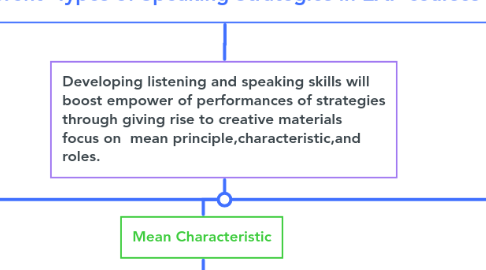
1. Developing listening and speaking skills will boost empower of performances of strategies through giving rise to creative materials focus on mean principle,characteristic,and roles.
1.1. Mean principles of strategies in EAP
1.1.1. The main principles of strategies in English for Academic Purposes (EAP) involve fostering effective communication, academic language proficiency, critical thinking, cultural awareness, and task-specific skills for academic success..
1.1.1.1. First, principle is focus on academic and professional comunication skills this includes genres
1.1.1.1.1. Putting forward study how the languages are performance, including functions such as phonology, phonetics, and how they work together.
1.1.1.2. Second, focus on development listening comprehension instead of concentrate on development oracy . Both skills are listening and speaking
1.1.1.2.1. Involving individual roles, social ,linguistics,and languages.Also, encourages the learners to performance development critical thinking
1.1.1.3. Third, focusing on develop students' languages in the context of oral text.
1.1.1.3.1. Boosting to the students to the development of responsibility in the presentation.Also, performance of habits as task-creating, and addressed portfolios for listening, and speaking.
1.2. Mean Characteristic
1.2.1. Navigating academic listening and speaking events involves engaging in lectures, presentations, seminars, tutorials, one-to-one meetings, group projects, and networking within academic communities, fostering comprehensive communication skills and knowledge exchange.
1.2.1.1. EAP LECTURE
1.2.1.1.1. In an EAP lecture on environmental science, the professor integrates academic language, employs visual aids, and encourages student interaction. This enhances comprehension, critical analysis, and language proficiency within the context of the subject matter.
1.2.1.2. EAP PRESENTATION
1.2.1.2.1. EAP presentations aim to enhance language skills and academic communication. A successful EAP presentation involves clear articulation, visual aids, and audience engagement. For instance, a sociology presentation on cultural diversity integrates multimedia, fostering interactive learning and language development.
1.2.1.3. SEMINARS
1.2.1.3.1. Seminars in English for Academic Purposes (EAP) are interactive forums fostering collaborative learning. Effective EAP seminars involve student participation, critical discussions, and language development. For instance, a literature seminar explores diverse interpretations, promoting language proficiency and analytical skills
1.3. Mean roles
1.3.1. Learners engage in diverse roles within social, individual, linguistic, and textual dimensions, navigating professional collaboration, linguistic analysis, and text comprehension. Purpose-driven involvement empowers learners to achieve targeted outcomes.
1.3.1.1. SOCIAL
1.3.1.1.1. In EAP, the social dimension encompasses professional collaboration. It should promote interactive discussions, enhancing language skills. For instance, a group project on sustainability requires students to collaborate on research, fostering language development and teamwork.
1.3.1.2. INDIVIDUAL
1.3.1.2.1. In EAP, the individual role involves initiating and influencing. It should foster independent thinking and persuasive skills. For example, a solo presentation on technological advancements requires students to articulate ideas convincingly, honing language proficiency.
1.3.1.3. LINGUISTIC
1.3.1.3.1. The linguistic aspect in EAP involves academic language analysis. It should enhance language proficiency. For example, an academic writing workshop focuses on linguistic precision, refining students' language use in scholarly contexts.
1.3.1.4. TEXTUAL
1.3.1.4.1. In EAP, the textual dimension involves genre and organization. It should refine text comprehension. For example, a presentation on research articles explores textual features, fostering students' ability to analyze academic writing styles
